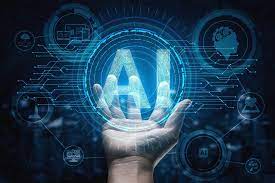
According to the OECD, more than a quarter of employment in the region depend on abilities that the impending artificial intelligence revolution might readily automate, and people worry that AI would replace them with robots.
There are 38 members of the Organisation for Economic Co-operation and Development (OECD), most of which are developed countries but also include some rising economies like Mexico and Estonia.
The emergence of AI hasn't yet shown much indication of having a substantial influence on jobs, but that could be because the revolution is still in its early stages, according to the OECD.
According to the Paris-based OECD's 2023 Employment Outlook, jobs with the highest automation risk account for 27% of the labour force on average across its member nations, with eastern European countries being the most vulnerable.
Jobs with the highest automation risk were those requiring more than 25 of the 100 skills and aptitudes identified by AI specialists as being easily automatable.
In contrast, according to a survey conducted by the OECD last year, three out of five workers worry that AI could cost them their jobs within the next ten years. The poll included 5,300 workers from 2,000 businesses in seven OECD countries, including manufacturing and finance.
Before the exponential advent of generative AI like ChatGPT, the survey was conducted.
Despite concerns about AI's impending arrival, two-thirds of employees who had already used it claimed that automation had made their work less hazardous or tiresome.
"How AI will ultimately impact workers in the workplace and whether the benefits will outweigh the risks, will depend on the policy actions we take," OECD Secretary General Mathias Cormann told a news conference.
"Governments must help workers to prepare for the changes and benefit from the opportunities AI will bring about," he continued.
While governments and authorities must make sure that workers' rights are not violated, minimum wages and collective bargaining could help reduce the pressure that AI might put on salaries, according to the OECD.
(Source:www.businesstoday.in)
There are 38 members of the Organisation for Economic Co-operation and Development (OECD), most of which are developed countries but also include some rising economies like Mexico and Estonia.
The emergence of AI hasn't yet shown much indication of having a substantial influence on jobs, but that could be because the revolution is still in its early stages, according to the OECD.
According to the Paris-based OECD's 2023 Employment Outlook, jobs with the highest automation risk account for 27% of the labour force on average across its member nations, with eastern European countries being the most vulnerable.
Jobs with the highest automation risk were those requiring more than 25 of the 100 skills and aptitudes identified by AI specialists as being easily automatable.
In contrast, according to a survey conducted by the OECD last year, three out of five workers worry that AI could cost them their jobs within the next ten years. The poll included 5,300 workers from 2,000 businesses in seven OECD countries, including manufacturing and finance.
Before the exponential advent of generative AI like ChatGPT, the survey was conducted.
Despite concerns about AI's impending arrival, two-thirds of employees who had already used it claimed that automation had made their work less hazardous or tiresome.
"How AI will ultimately impact workers in the workplace and whether the benefits will outweigh the risks, will depend on the policy actions we take," OECD Secretary General Mathias Cormann told a news conference.
"Governments must help workers to prepare for the changes and benefit from the opportunities AI will bring about," he continued.
While governments and authorities must make sure that workers' rights are not violated, minimum wages and collective bargaining could help reduce the pressure that AI might put on salaries, according to the OECD.
(Source:www.businesstoday.in)





